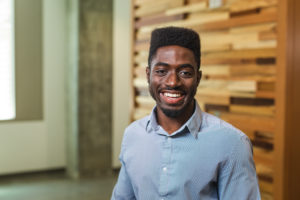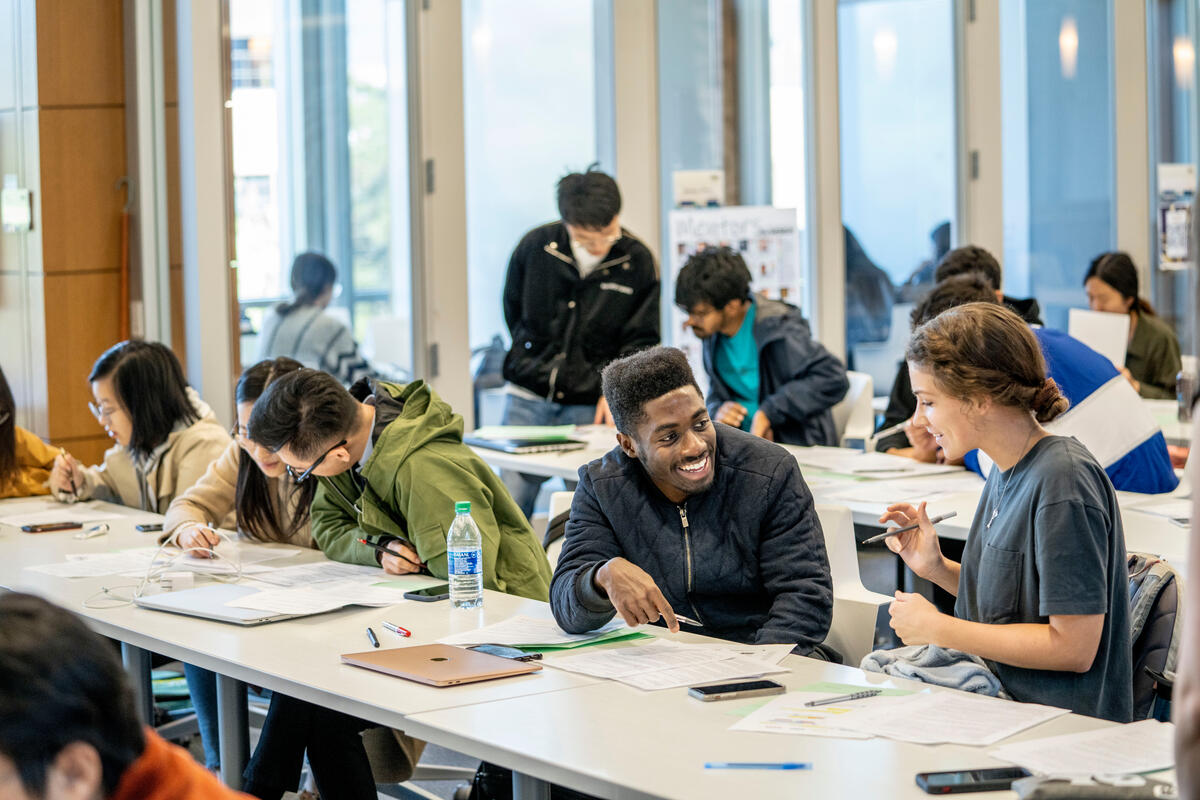Seizing the Opportunity to Accomplish Lifelong Goals: Alfred Prah, BA’19

As a student in Ghana, Alfred Prah, BA’19, didn’t have access to a laptop or personal cell phone at the boarding school he attended. Despite that, he was captivated by the potential of technology to enrich his education and had dreams of using AI to make technology more useful and accessible to everyone. He knew that U.S. college students had a wealth of technological resources at their fingertips, so he decided that studying abroad was his best chance to reach his educational goals. For him, attending Vanderbilt was about capturing opportunity.
Prah was so committed to studying abroad, in fact, that he took a gap year just to apply to colleges and found Vanderbilt during that time. Though he came to the university as a computer engineering major, the College of Arts and Science’s Communication of Science and Technology (CSET) program caught his eye during his sophomore year. He saw CSET as an opportunity not just to benefit himself, but also to create opportunity for others. As a kid, he had noticed that people with limited education often struggled to understand how scientific and technological advancements could improve their lives.
“I saw how hard it was to bridge the gap between people who understood these advancements and people who didn’t,” Prah said. “I felt like, if I did the CSET major, I could pick up some of these concepts, understand them at a higher level, and translate them so that even people without access to an iPad could pick them up and be able to understand.”
Once at Vanderbilt, Prah recognized a roadblock to seizing the many opportunities available to him on campus. “It was difficult to adjust to life in the U.S. It was the longest time I had spent away from my family—the emotions were hard. There was a danger that the cultural adjustments would keep me from achieving what I came here to achieve,” he said.
But through caring and support from a surrogate Vanderbilt family, he was able to work through those challenges and focus on his goals. Campus dining staff Suzette Roberson and Barbara Mitchell, along with Cole Hall custodian Mary Hampton, “were totally mother figures,” he said. He also received valuable mentoring from Black Cultural Center Director Rosevelt Noble and School of Engineering associate dean Burgess Mitchell, who guided him through the cultural transition of moving to Nashville.

At the same time that he was studying in the classroom and acclimating to a new culture, Prah was trying to keep a small business afloat. He had founded a clothing enterprise during his gap year in Ghana, and he was determined to continue it in the U.S. After a disastrous Black Friday sale that made no money, however, he realized that he didn’t understand his new customer base.
To help his business, Prah maximized the opportunities available to him through Vanderbilt’s interdisciplinary, collaborative culture. He created a consumer research project and, after searching through Owen Graduate School of Management’s website for someone with relevant expertise, approached marketing professor Dawn Iacobucci for help. She not only provided valuable assistance with his research, she became one of his key undergraduate mentors. Through his corporate strategy minor, Prah also completed an internship with Nashville-based Jumpstart Foundry, a seed-stage venture capital firm focused on the health care industry. These data-focused experiences had a slightly different result than he had expected. While they benefited his business, they also helped him find his true passion: combining science communication, data science, and marketing. When Vanderbilt started a brand-new M.S. in data science during Prah’s final undergraduate semester, he recognized an unexpected opportunity to advance his education.
The decision to enroll in the data science program wasn’t easy. Prah had to weigh two competing opportunities: getting his M.S. or accepting a data-related job offer in California. In the end, he felt like he wasn’t ready to step away from formal education—and he’s been very thankful that he made the choice he did. The job he turned down, he later learned, would not have provided the opportunity to do original work in artificial intelligence (AI), his longtime dream. In the data science program, however, he’s built his own Twitter bot that measures brand sentiment. He also recently completed an internship with Nashville-based OhanaHealth, where he built an AI system that helps match students and recent graduates with internships and full-time jobs in the health-tech industry. His CSET degree was an asset in that position, as it helped him better communicate his work to the company’s leadership and other non-tech audiences.
With just one year to go on his M.S. degree, Prah is looking forward to his ultimate goal: building AI for natural-language processing, which enables applications such as Siri, Alexa, and search engines to understand natural speech. The technology can be used for product searches, social listening, automated customer service, and other marketing- and sales-oriented functions. Prah is also looking back and feeling thankful that he seized the opportunity to come to Vanderbilt.
“I had to give myself space to deal with the separation from my family and the cultural changes, but I also had to figure out how to make the most of my four years so I wouldn’t end up looking back with regret,” Prah said. “Working with AI has been a lifelong dream of mine—my cousin and I used to talk about it as kids. Coming here set me on the path to fulfilling that dream.”
